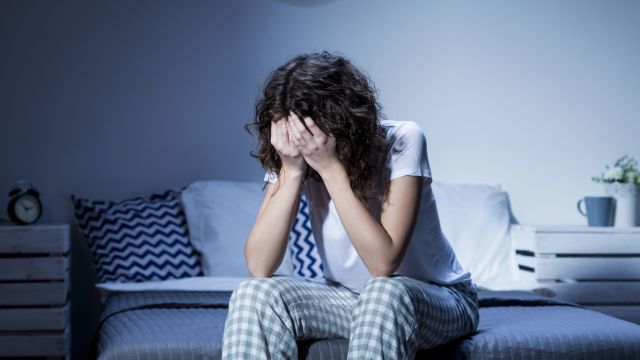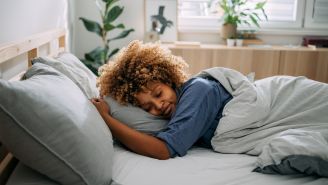Do you often worry about whether you’ll be able to fall asleep? Have you convinced yourself that you have insomnia? Doing so can lead to serious health consequences even if you don’t have the sleep disorder, says Kenneth L. Lichstein, PhD, director of the Sleep Research Project at the University of Alabama.
Dr. Lichstein’s interest in this strange paradox—what he calls insomnia identity—began with a 1995 study by Catherine Fichten, PhD, and her colleagues out of the Sir Mortimer B. Davis-Jewish General Hospital in Montreal. In the study, 147 volunteers with poor sleep completed questionnaires about their sleep. “It was one of the first to ask people how distressed they were about their poor sleep,” Lichstein says. “A lot of them said they weren’t distressed. They recognized that they had poor sleep and it didn't bother them.” On the other hand, some were distressed about not sleeping well.
The researchers then compared the study participants with normal sleepers. The poor sleepers upset about their sleep showed more daytime impairment; they were groggy during the day or had trouble with memory, attention and balance. But, quite unexpectedly, the people who weren’t upset about poor sleep functioned just as well as normal sleepers did.
More evidence that sleep worries matter
Based on a review of some 10 studies from the past 20 years, Lichstein produced a report on insomnia identity that was published in Behavior Research and Therapy in 2017. After analyzing the data, he says, “We now have consistent findings that it’s the worry about sleep that confers the health risk, not the poor sleep.”
Lichstein says there’s an “uncoupling phenomenon” at the heart of insomnia identity. “We found that sometimes people call themselves an insomniac when their sleep is objectively good,” he explains. “Some people with poor sleep don’t complain about their sleep. Some people with good sleep complain about their sleep.”
Uncoupling simply refers to the mismatch between a person’s attitude about their sleep and how they actually slept. He says that about one-third of people who think of themselves as insomniacs are actually good sleepers.
Alarming health risks
Lichstein’s analysis reveals a range of symptoms and conditions stemming from insomnia identity:
- Hypertension: The likelihood of hypertension increased by 350 to 500 percent, depending on the degree of short sleep.
- Depression and anxiety: Good sleepers who complained about their sleep had the highest levels of anxiety and depression. Poor sleepers who didn’t express worries had the lowest.
- Increased mortality risk: Men, but not women, who identified as having insomnia and poor sleep were at greater risk for all-cause mortality.
Problems with sleeping pills
Insomnia identity is a condition little known outside the community of researchers now studying it. And for a variety of practical reasons, no more than a token sleep assessment is usually performed when patients see their doctor complaining about sleep. That means that some patients who don’t need treatment will get it regardless. In fact, data from the study suggests that when a person is given an insomnia diagnosis, it will be wrong 37 percent of time.
This creates an additional health problem, since the most common treatment for insomnia is sleeping pills, Lichstein explains. Sleeping pills carry health risks of their own, including daytime grogginess, balance issues and trouble concentrating. The number of car accidents, falls and hip fractures increase as well.
Who’s at risk for insomnia identity?
According to Lichstein, there is no easy answer to this question. “We don’t know why some people develop it and others don’t. This is a puzzle. Research hasn’t addressed that yet.”
Studies included in his analysis point to possible risk factors:
- Unrealistic standards of what constitutes “normal sleep.” In one study, participants who took 15 minutes to doze off after going to bed believed that normal sleepers fell asleep in less than 10 minutes—to them, an indication that they had insomnia. But according to the National Sleep Foundation, the average amount of time it takes to fall asleep is 10 to 20 minutes, putting them well within the “normal” range.
- Preconceptions of what it means to have insomnia. A misunderstanding of the actual symptoms could cause one to think they have insomnia, even if they don’t.
Help for sleep problems
Lichstein says there are lots of reasons people may be awake when they want to sleep, which may not be related to insomnia identity; these include poor sleep hygiene (bad habits that get in the way of winding down and falling asleep) or physical disorders, like chronic pain or multiple sclerosis. Still, if you often worry about sleeping and whether you have insomnia, Lichstein suggests the following:
- Focus on your daytime functioning: Being alert and in an okay mood (not groggy or grumpy), and able to engage in normal social and work activities are all signs that you got enough sleep the night before.
- Don’t worry about disturbed sleep: You may awaken occasionally or not sleep as long as you want. But if you feel fine the next day and function well, you don't have insomnia.
- Try sleep therapy. If sleep isn’t restorative, or you don’t feel you get enough, you might want to consider Cognitive Behavioral Therapy-Insomnia—a specific type of therapy that helps you develop habits that promote good sleep. It can also help you change thoughts or actions that get in the way of your ability to sleep well.
The bottom line? “Worrying about sleep or worrying about whether or not you are an insomniac is never helpful,” says Lichstein. “If people can adopt a more relaxed attitude about their sleep, they will benefit from that.”






